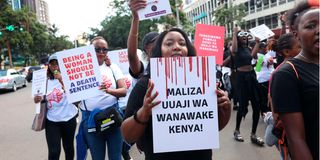Why Kenya's patriarchal society continues to enable femicide - and how we must fight back

Women in Nairobi participate in a procession dubbed 'Feminist march against femicide' on January 27, 2024. They protested against the rising cases of femicides experienced across the country.
What you need to know:
- Kenya faces a deadly femicide crisis, with at least 150 recorded cases in 2023 and approximately one woman killed daily by trusted individuals.
- The crisis demands urgent multi-faceted solutions, including legal reforms, economic empowerment, and dismantling patriarchal norms that fuel gender-based violence.
- While President Ruto has pledged support, real change requires sustained resources, unwavering policy commitments, and strong political leadership to address both enforcement gaps and societal drivers.
Kenya is grappling with an escalating crisis of femicide, the most severe form of gender-based violence that claims women's lives simply because of their gender. The statistics paint a haunting picture: Femicide Count Kenya documented at least 150 cases in 2023, while Deputy Inspector General of Police Eliud Lagat revealed an even more chilling reality—97 femicide cases recorded by law enforcement in just three months, translating to approximately one woman killed every day. These numbers, representing only media-reported cases, likely mask an even grimmer truth.
The tragedy lies not just in the numbers but in the betrayal: most victims lose their lives at the hands of those they trusted most—partners, family members, friends, and close associates. What should be the safest space—home—has become a battleground, with approximately 80 per cent of homicides occurring within domestic walls. This crisis strikes at the heart of Kenya's constitutional values and demands immediate, decisive action.
While Kenya boasts a rich history of community and policy-level activism against violence targeting women and girls, the current situation calls for more comprehensive measures. President Ruto's recent commitment to ending gender-based violence marks a crucial step forward, but the path to meaningful change requires a multi-faceted approach targeting deep-rooted societal issues.
Toxic masculinity
At the core of this crisis lies the persistent challenge of patriarchal social norms, where some men continue to view women as property. This mind-set perpetuates widespread violence against women (VAW) and demands targeted intervention through education and awareness campaigns. These initiatives must specifically address toxic masculinity, power imbalances, and gender discrimination that fuel the cycle of violence.
Legal reform stands as a critical pillar in this fight. Femicide needs recognition as a separate criminal offense, enabling Kenyan legal institutions to enact specific laws addressing this crime. This reform requires developing comprehensive investigative protocols for law enforcement officers and clear guidelines for prosecutors. Simultaneously, existing laws related to femicide and gender-based violence must be strictly enforced, ensuring swift justice for victims.
Women's economic empowerment emerges as another crucial battlefront. By providing women and girls with economic opportunities and resources, their vulnerability to violence significantly decreases. NGOs and the government must expand programs focusing on entrepreneurship, financial literacy, and employment opportunities. Equally important is the provision of comprehensive psychosocial support for GBV survivors, addressing the growing need for assistance stemming from increased femicide incidents.
Societal attitudes
Law enforcement agencies require a complete overhaul in their approach to femicide cases. This includes continuous training and adequate resources to handle cases with sensitivity, urgency, and professionalism. Gender Desks at police stations need proper staffing with trained personnel, and Policare services must extend their reach nationwide. Justice must be swift and uncompromising—any delay not only denies victims their rights but undermines the entire system's credibility.
The strengthening of investigative capabilities demands a multidisciplinary approach. Forensic resources must be improved, and corruption that might influence case outcomes must be eliminated. Victims deserve active participation in all legal proceedings, and perpetrators must face consequences regardless of their social or political standing.
Media plays a pivotal role in this battle by challenging harmful stereotypes and attitudes that perpetuate gender-based violence. Through strategic coverage and awareness campaigns, mainstream media can help reshape societal attitudes. The digital age offers new opportunities for combat: social media platforms and mobile applications can provide easier access to crucial information and services. The government's collaboration with tech start-ups could yield innovative solutions for raising awareness and mitigating violence risks.
Coordinated effort
Political leadership must extend beyond mere rhetoric. Leaders must actively listen to women's experiences, challenge misogynistic narratives and victim-blaming, and respond concretely to victims' demands. President William Ruto's recent call to security agencies and pledge of resources demonstrates promising political will, but sustained commitment remains essential for lasting change.
Quality data collection emerges as a fundamental tool in this fight. A comprehensive database of GBV incidents will help monitor trends and patterns across Kenya, while extensive research into causes and risk factors can inform more effective policies and interventions. This data-driven approach is essential for identifying root causes and formulating strategic solutions that address both immediate manifestations of violence and their underlying causes.
Comparative cases globally demonstrate that combating femicide requires sustained resources, unwavering policy commitments, and strong political leadership addressing both law enforcement gaps and deeper societal drivers. Success demands a coordinated effort across all sectors—legal, educational, economic, and social. The fight against femicide in Kenya stands at a critical juncture. While the challenges are formidable, they are not insurmountable. Through collective action and unwavering commitment, Kenya can work toward a future where women no longer face the threat of gender-based violence. The time for action is now, for every day of delay costs another precious life.
Fatuma M Mohamed is a governance, peace and security expert





